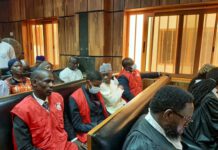A former Chief of Army Staff (COAS), Lt.-Gen. Abdulrahman Dambazzau, on Tuesday, said intelligence gathered and monitoring done by security agencies is not enough to combat insecurity.
Lt.-Gen. Tukur Buratai, another former COAS described coups in African countries as organised crime.
Information Nigeria reports that the duo spoke at the Nigerian Army Resource Centre in Abuja as part of an international conference on “Organised Crimes” hosted by the Tukur Buratai Centre for Contemporary Security Affairs in collaboration with Igbenedion University, Okada in Edo State.
Speaking on “Organised Crimes Network as an Emergent Threat to National Security,” Dambazzau said it was critical for Nigeria to work with the United States (US) and other African countries to combat organised crime such as terrorism.
He said: “For instance, US has two bases in the Niger Republic, and they have the bases there for their own interests. It is also important that we partner with them in order to leverage on whatever technology they have and whatever they deploy, their drone bases and their sources of intelligence.
READ ALSO: ‘We Were Paid N50 Million To Kill Apostle Suleman’- Suspect Confesses
“If we’re able to partner with them, we’ll be able to capture actionable intelligence and we will be able to deal with them. Of course, monitoring or having intelligence is not enough, if we don’t develop our capacity, because we must be able to have the means moving in terms of emergency.
“If you monitor something without getting to that thing, it means nothing to you. Intelligence without action means nothing. We must be able to equip our security agencies, train them on the capacity, they must be able to act. Not just to monitor but they must be able to act on time in order to deal with the situation.”
Buratai however said the battle against organised crime required concerted efforts of experts, policymakers and stakeholders from diverse sectors.
“The best way is for the military to remain within the constitutional bounds and also encourage the civil administration to do their best to solve the governance challenges or the developmental challenges of our country,” he said.





